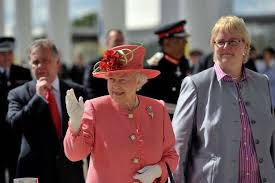A curious notion. And I’m grateful to my wife for recommending I listen to the latest episode of Evan Davis’ BBC Radio 4 programme The Bottom Line to hear it.
The speaker was Julie Moore, a nurse by training, and Chief Executive of University Hospitals Birmingham. She had me on her side as soon as she stated a principle which can’t be stressed too much: though we keep being told that the NHS employs too many people in administrative, non care-related roles, the reality is that we need more, if only to free up nursing time.
 |
| Julie Moore with an acquaintance of hers |
It’s possible to keep wards quiet by employing a lot more word clerks, who take all the phone calls and deal with the paperwork, in rooms kept separate from wards so they disturb no patients. It’s a win-win arrangement, because if frees up their time, so nurses can constantly move among a small number of patients assigned to them, and it’s possible to eliminate call bells too – a nurse will be around to see you as part of the routine of work more quickly than if summoned by a bell – and, of course, with less noise.
Julie Moore talked about the application of the same principle in another context:
One of the things we have done is look at the various roles. I have a great concern that all we measure in the country at the moment is nurse staffing levels. What we did a while ago, was say we don’t want qualified nurses putting away stores… [and similar general work] … so we created housekeeper roles, storekeeper roles. That really did help productivity. You had someone whose job was to keep all the store cupboards stocked up with everything the nurses needed, make sure they’re not overstocked and, all the rest of it…
The results were excellent, though that should surprise no one. After all, the principle is simple. They had:
… qualified nurses looking after patients, and storekeepers looking after stores, and it worked very, very well.
But how about the counter-intuitive notion of appointing two people for one post? How can that work?
One of the major problems in the NHS is its over-dependence on temporary staff, agency or bank staff, to fill shortfalls. Since the Francis report into the disastrous failures of care at Mid Staffordshire hospital, there has been an obligation not to let staff numbers fall below certain levels, and that often makes it necessary to take on temporary staff.
Simon Stevens, Chief Executive of the NHS in England, pointed out recently that spending on agency nursing was running at twice the expected levels.
Here’s Julie Moore’s take on the problem:
It’s far more important to have permanent staff for your own staff than employ temporary staff like agency staff. We see productivity go down when we do that, but most importantly from our perspective, quality goes down. So we’ve run a policy in the past three or five years now of over-recruiting staff. So that the mantra is, if you interview two good people for one job, employ them both. And we’ve found productivity, every which way you want to measure that, not just around patients, but actually sick time, morale, the questionnaires that staff fill in, have all got better as a result of that, and we spend far less on our overall nursing bill.
The bill goes down, and quality goes up. As many have often argued, the best care is often the least expensive care. But it’s particularly striking, and highly refreshing, to discover that over-recruiting in the NHS can help.
The principle for Julie Moore is: “Don’t let a good person go unappointed…”
The results have been staggering.
The first year we did that our pay bill went down £850,000.
Julie Moore was made a dame (knighted) by a Tory government. On the other hand, the chair of the Trust that runs her hospital is Jacqui Smith, former Labour MP and the first woman to hold the post of Home Secretary. Julie Mooore’s approach is non-partisan.
It shows what can be done in the NHS. When you have leaders bold enough to take effective decisions, even when they’re counter-intuitive. And when politics is kept out of the equation.
No comments:
Post a Comment